Building the Cognitive Enterprise in the Energy Sector
Abstract
1. Introduction
2. Materials and Methods
- (a)
- Differences in the classification of information they accept; the returned results may not be the same;
- (b)
3. Results
4. Discussion
- The research is highly focused in several countries and in several institutions and research teams;
- There is a lack of scientific research on the cognitive enterprise concept;
- There is a small number of scientific publications on cognitive issues in visualizations, dashboards, and ERP systems in the energy sector.
- There is a small number of scientific publications on blockchain and edge computing due to their novelty;
- There is a lack of research on the connection of the United Nations (UN) sustainable development goals (SDG) and the cognitive enterprise concept.
- A decreasing trend in publications on cognitive computing during the 2020–2021 year;
- Cognitive-inspired computing still struggles with fundamental, long-standing problems in building computational models and decision-making mechanisms [31];
- The need for reinventing core management areas such as BPM, knowledge management, and human resources, etc.;
- The small number of scientific publications with a high impact in core areas such as cognitive enterprise, cognitive BPM, and competence transformation in the energy industry [32];
- The noticeable geographical research concentration with leading positions of certain countries such as the USA, China, and Germany.
5. Conclusions
Funding
Data Availability Statement
Conflicts of Interest
Appendix A
| Blockchain | BD | AI | 5G | IoT | EC | RPA | ||
|---|---|---|---|---|---|---|---|---|
| Blockchain | Pearson’s r | — | ||||||
| p-value | — | |||||||
| BD | Pearson’s r | 0.820 | — | |||||
| p-value | 0.007 | — | ||||||
| AI | Pearson’s r | 0.982 | 0.818 | — | ||||
| p-value | <0.001 | 0.007 | — | |||||
| 5G | Pearson’s r | 0.877 | 0.934 | 0.837 | — | |||
| p-value | 0.002 | <0.001 | 0.005 | — | ||||
| IoT | Pearson’s r | 0.904 | 0.964 | 0.867 | 0.967 | — | ||
| p-value | <0.001 | <0.001 | 0.002 | <0.001 | — | |||
| EC | Pearson’s r | 0.994 | 0.846 | 0.968 | 0.906 | 0.928 | — | |
| p-value | <0.001 | 0.004 | <0.001 | <0.001 | <0.001 | — | ||
| RPA | Pearson’s r | 0.876 | 0.906 | 0.850 | 0.909 | 0.938 | 0.868 | — |
| p-value | 0.002 | <0.001 | 0.004 | <0.001 | <0.001 | 0.002 | — |
References
- Elia, G.; Margherita, A. A conceptual framework for the cognitive enterprise: Pillars, maturity, value drivers. Technol. Anal. Strateg. Manag. 2021, 34, 377–389. [Google Scholar] [CrossRef]
- Building the Cognitive Enterprise: Nine Action Areas Core Concepts. Available online: https://www.ibm.com/downloads/cas/VPGQAGEY (accessed on 17 July 2022).
- Ramadoss, B. Enabling A Cognitive Enterprise. The Cognitive Enterprise: Activating Cognitive DNA. 28 August 2019. Available online: https://www.forbes.com/sites/forbestechcouncil/2019/08/28/the-cognitive-enterprise-activating-cognitive-dna/ (accessed on 20 July 2022).
- Available online: https://www.forbes.com/sites/forbestechcouncil/2019/08/28/the-cognitive-enterprise-activating-cognitive-dna/?sh=607b669e58bf (accessed on 12 July 2022).
- Building the Cognitive Enterprise: Nine Action Areas: Deep Dive. Available online: https://www.ibm.com/downloads/cas/JKJA41PW (accessed on 10 July 2022).
- Building the Cognitive Enterprise: A Blueprint for AI-Powered Transformation. Available online: https://www.ibm.com/thought-leadership/institute-business-value/report/build-cognitive-enterprise (accessed on 12 July 2022).
- Hernes, M. A cognitive integrated management support system for enterprises. In International Conference on Computational Collective Intelligence; Springer: Cham, Switzerland, 2014; pp. 252–261. [Google Scholar]
- Designed to Run. Available online: https://www.tietoevry.com/en/campaigns/2021/cognitive-enterprise/ (accessed on 11 July 2022).
- Vezzoli, C.; Ceschin, F.; Osanjo, L.; M’Rithaa, M.K.; Moalosi, R.; Nakazibwe, V.; Diehl, J.C. Energy and sustainable development. In Designing Sustainable Energy for All; Vezzoli, C., Ed.; Springer: Berlin/Heidelberg, Germany, 2018; pp. 3–22. [Google Scholar]
- Broadus, R. Toward a definition of “bibliometrics”. Scientometrics 1987, 12, 373–379. [Google Scholar] [CrossRef]
- Liao, H.; Tang, M.; Luo, L.; Li, C.; Chiclana, F.; Zeng, X.J. A bibliometric analysis and visualization of medical big data research. Sustainability 2018, 10, 166. [Google Scholar] [CrossRef]
- Diem, A.; Wolter, S.C. The use of bibliometrics to measure research performance in education sciences. Res. Higher Educ. 2013, 54, 86–114. [Google Scholar] [CrossRef]
- Ismail, S.; Nason, E.; Marjanovic, S.; Grant, J. Bibliometrics as a tool for supporting prospective R&D decision-making in the health sciences: Strengths, weaknesses and options for future development. Rand Health Q. 2012, 1, 11. [Google Scholar]
- Reyes-Belmonte, M.A. Bibliometric Analysis on Energy Research. Available online: https://encyclopedia.pub/entry/2453 (accessed on 17 July 2022).
- Trianni, A.; Merigó, J.M.; Bertoldi, P. Ten years of Energy Efficiency: A bibliometric analysis. Energy Effic. 2018, 11, 1917–1939. [Google Scholar] [CrossRef]
- Gajdzik, B.; Grabowska, S.; Saniuk, S.; Wieczorek, T. Sustainable Development and Industry 4.0: A Bibliometric Analysis Identifying Key Scientific Problems of the Sustainable Industry 4.0. Energies 2020, 13, 4254. [Google Scholar] [CrossRef]
- Opejin, A.K.; Aggarwal, R.M.; White, D.D.; Jones, J.L.; Maciejewski, R.; Mascaro, G.; Sarjoughian, H.S. A Bibliometric Analysis of Food-Energy-Water Nexus Literature Open. Sustainability 2020, 12, 1112. [Google Scholar] [CrossRef]
- Entang, M.; Budiman, R.; Nina, K.; Candradewini, C.; Riki, M. Bibliometric Analysis and Visualization of Energy Economics and Policy in Scopus from 2010 to 2021. Int. J. Energy Econ. Policy 2021, 11, 503–507. [Google Scholar] [CrossRef]
- Ziabina, Y.; Pimonenko, T. The Green Deal Policy for Renewable Energy: A Bibliometric Analysis. Virtual Econ. 2020, 3, 147–168. [Google Scholar] [CrossRef]
- Kumar, R.; Singh, S.; Sidhu, A.S.; Pruncu, C.I. Bibliometric analysis of specific energy consumption (SEC) in machining operations: A sustainable response. Sustainability 2021, 13, 5617. [Google Scholar] [CrossRef]
- Xiao, Y.; Wu, H.; Wang, G.; Mei, H. Mapping the Worldwide Trends on Energy Poverty Research: A Bibliometric Analysis (1999–2019). Int. J. Environ. Res. Public Health 2021, 18, 1764. [Google Scholar] [CrossRef] [PubMed]
- Zhang, Y.; Yu, Q.; Li, J. Bioenergy research under climate change: A bibliometric analysis from a country perspective. Environ. Sci. Pollut. Res. 2021, 28, 26427–26440. [Google Scholar] [CrossRef] [PubMed]
- Rosokhata, A.; Minchenko, M.; Khomenko, L.; Chygryn, O. Renewable energy: A bibliometric analysis. E3S Web Conf. 2021, 250, 03002. [Google Scholar] [CrossRef]
- Ziegler, B.E. Methods for Bibliometric Analysis of Research: Renewable Energy Case Study. Ph.D. Thesis, Massachusetts Institute of Technology, Cambridge, MA, USA, 2009. [Google Scholar]
- Qin, Y.; Xu, Z.; Wang, X.; Škare, M. Green energy adoption and its determinants: A bibliometric analysis. Renew. Sustain. Energy Rev. 2022, 153, 111780. [Google Scholar] [CrossRef]
- De Oliveira, O.J.; Da Silva, F.F.; Juliani, F.; Barbosa, L.C.F.M.; Nunhes, T.V. Bibliometric Method for Mapping the State-of-the-Art and Identifying Research Gaps and Trends in Literature: An Essential Instrument to Support the Development of Scientific Projects. In Scientometrics Recent Advances; Kunosic, S., Zerem, E., Eds.; IntechOpen: London, UK, 2019. [Google Scholar]
- Abrizah, A.; Zainab, A.N.; Kiran, K.; Raj, R.G. LIS journals scientific impact and subject categorization: A comparison between Web of Science and Scopus. Scientometrics 2013, 94, 721–740. [Google Scholar] [CrossRef]
- Bartol, T.; Budimir, G.; Dekleva Smrekar, D.; Pusnik, M.; Juznic, P. Assessment of research fields in Scopus and Web of Science in the view of national research evaluation in Slovenia. Scientometrics 2014, 98, 1491–1504. [Google Scholar] [CrossRef]
- Juliani, F.; Oliveira, O.J. State of research on public service management: Identifying scientific gaps from a bibliometric study. Int. J. Inf. Manag. 2016, 36, 1033–1041. [Google Scholar] [CrossRef]
- Filser, L.; Silva, F.F.; Oliveira, O.J. State of research and future research tendencies in lean healthcare: A bibliometric analysis. Scientometrics 2017, 112, 799–816. [Google Scholar] [CrossRef]
- Ye, J.; Pang, S. Special issue on cognitive-inspired computing and applications. Neural Comput. Appl. 2022, 34, 2501–2502. [Google Scholar] [CrossRef]
- Pilipczuk, O. Cognitive Computing—Will It Be the Future “Smart Power” for the Energy Enterprises? Energies 2022, 15, 6216. [Google Scholar] [CrossRef]
- Channon, D.F.; Caldart, A.A. McKinsey 7S model. In Wiley Encyclopedia of Management; John Wiley & Sons: Hoboken, NJ, USA, 2015; p. 1. ISBN 978-1-118-78531-7. [Google Scholar] [CrossRef]
- The Cognitive Enterprise Part 1—The Journey to AI and the Rise of Platform-Centric Business Architectures 2018. Available online: https://www.ibm.com/downloads/cas/10OLAVXZ (accessed on 22 May 2022).
- 19th Global C-Suite Study, IBM Institute Business Value. Available online: https://www.ibm.com/thought-leadership/institute-business-value/en-us/c-suite-study (accessed on 25 July 2022).
- Jabłoński, M. Value Migration to the Sustainable Business Models of Digital Economy Companies on the Capital Market. Sustainability 2018, 10, 3113. [Google Scholar] [CrossRef]
- Pilipczuk, O. Sustainable Smart Cities and Energy Management: The Labor Market Perspective. Energies 2020, 13, 6084. [Google Scholar] [CrossRef]
- Pilipczuk, O. Determinants of Managerial Competences Transformation in the Polish Energy Industry. Energies 2021, 14, 6788. [Google Scholar] [CrossRef]
- Akbari, M.; Khodayari, M.; Danesh, M.; Davari, A.; Padash, H. A bibliometric study of sustainable technology research. Cogent Bus. Manag. 2020, 7, 1751906. [Google Scholar] [CrossRef]
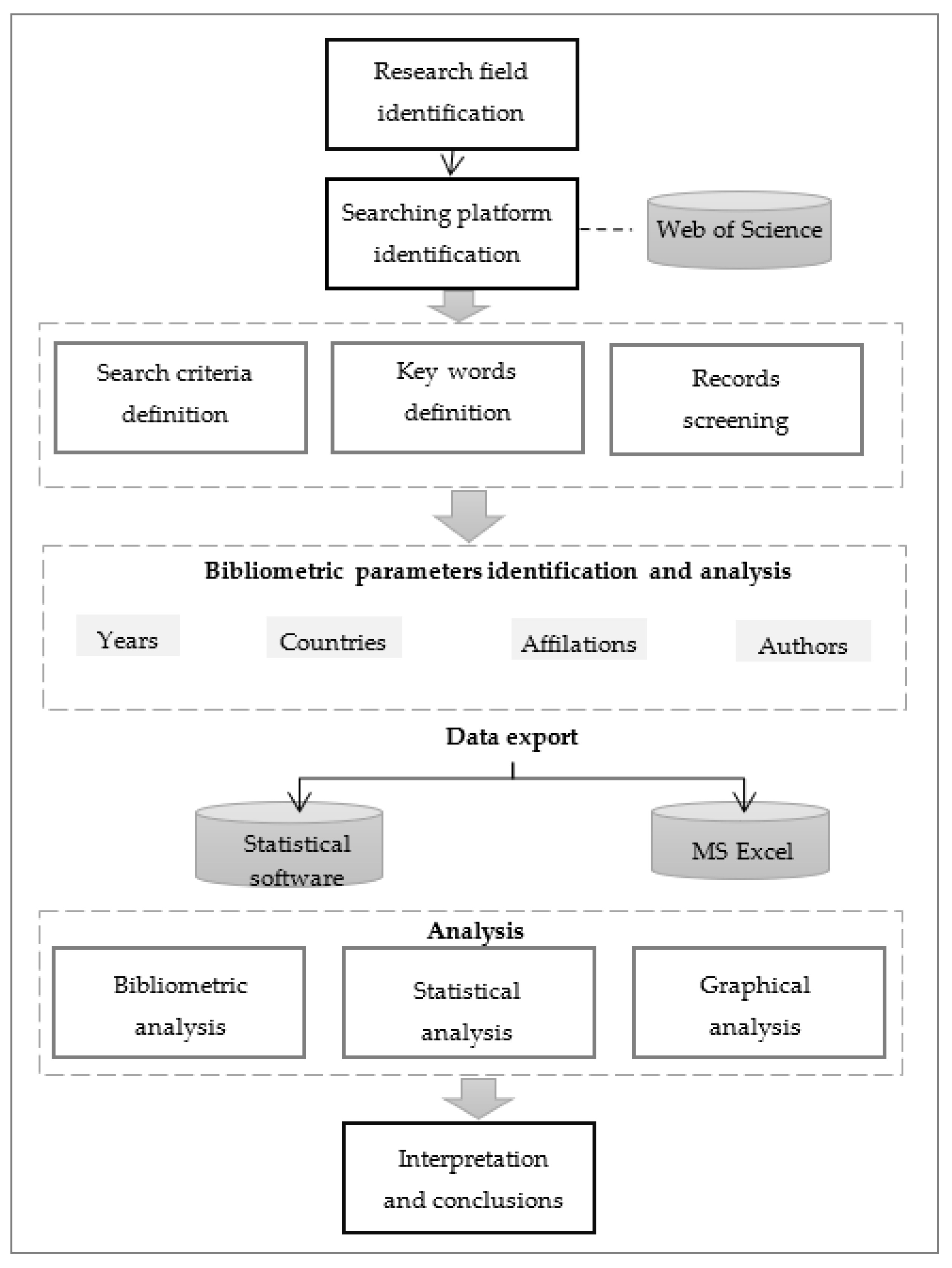

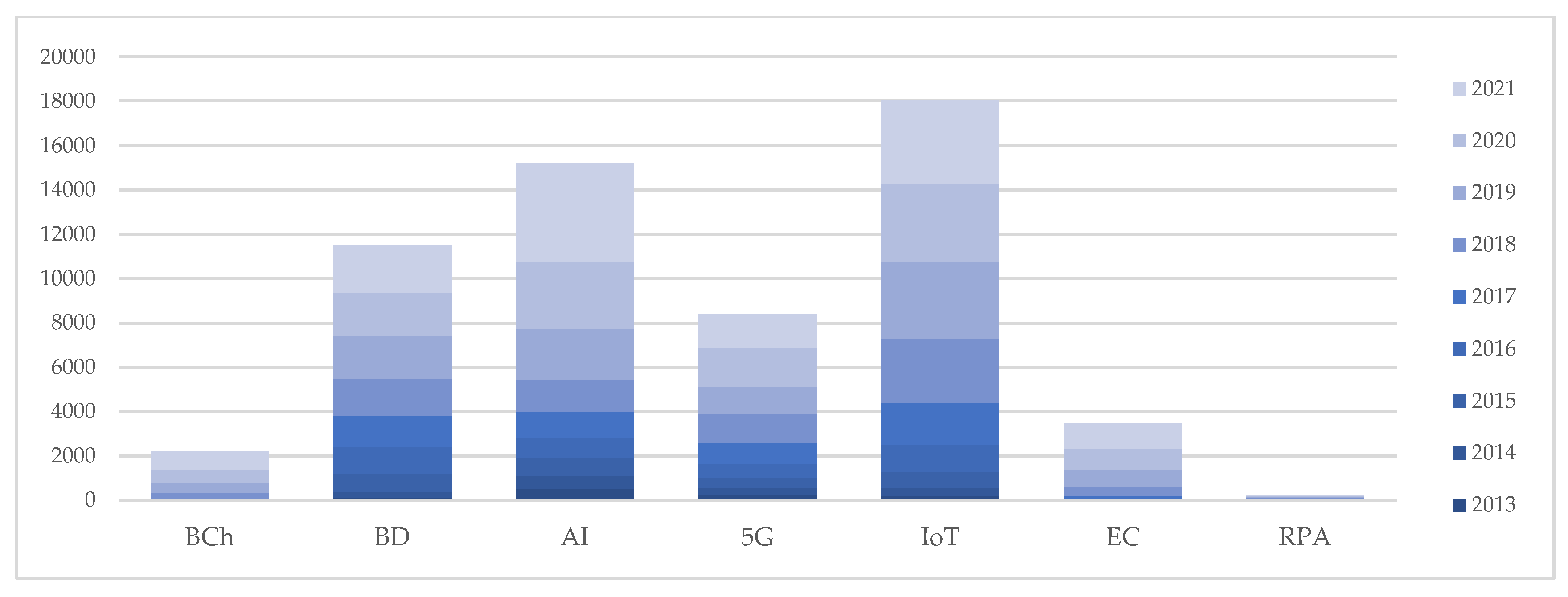

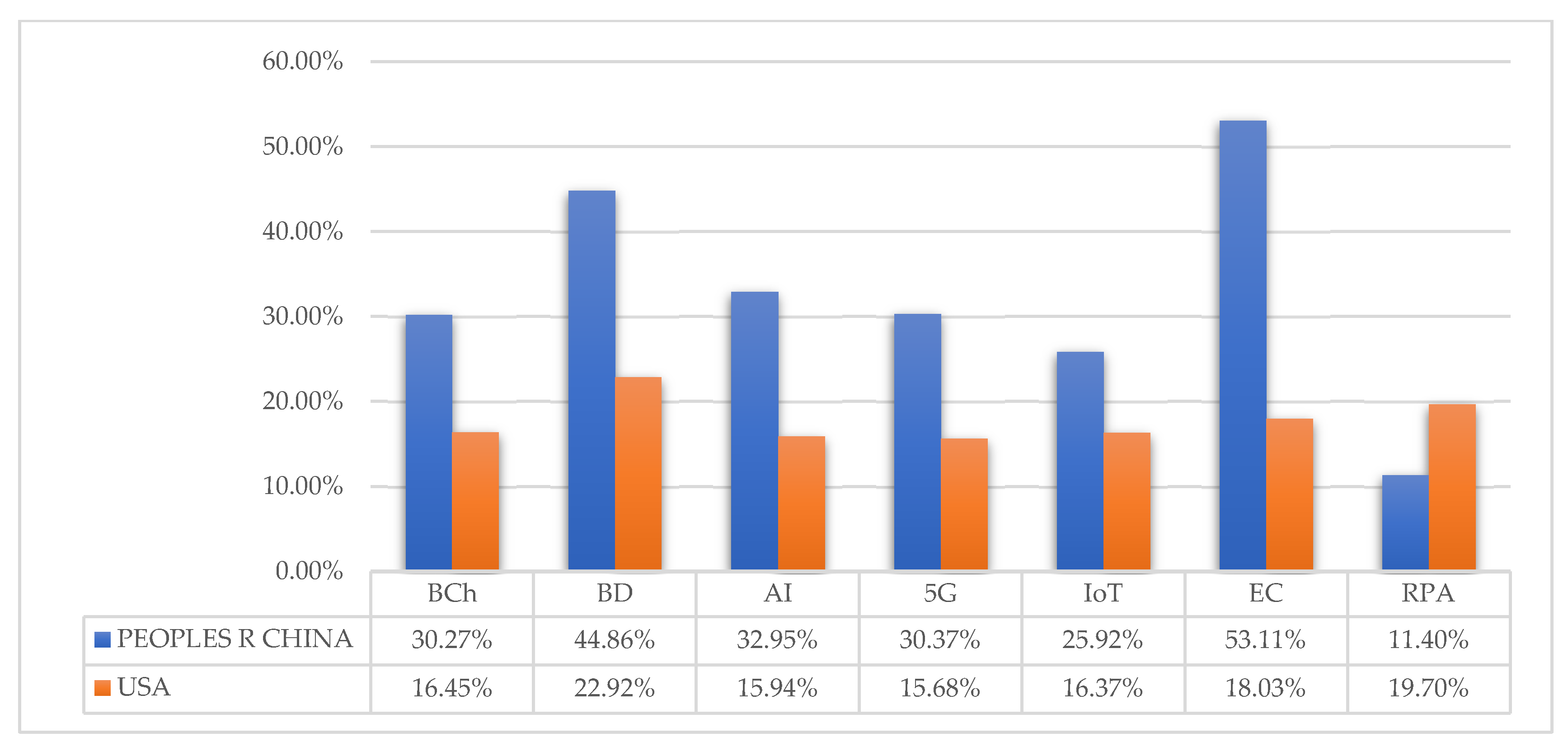
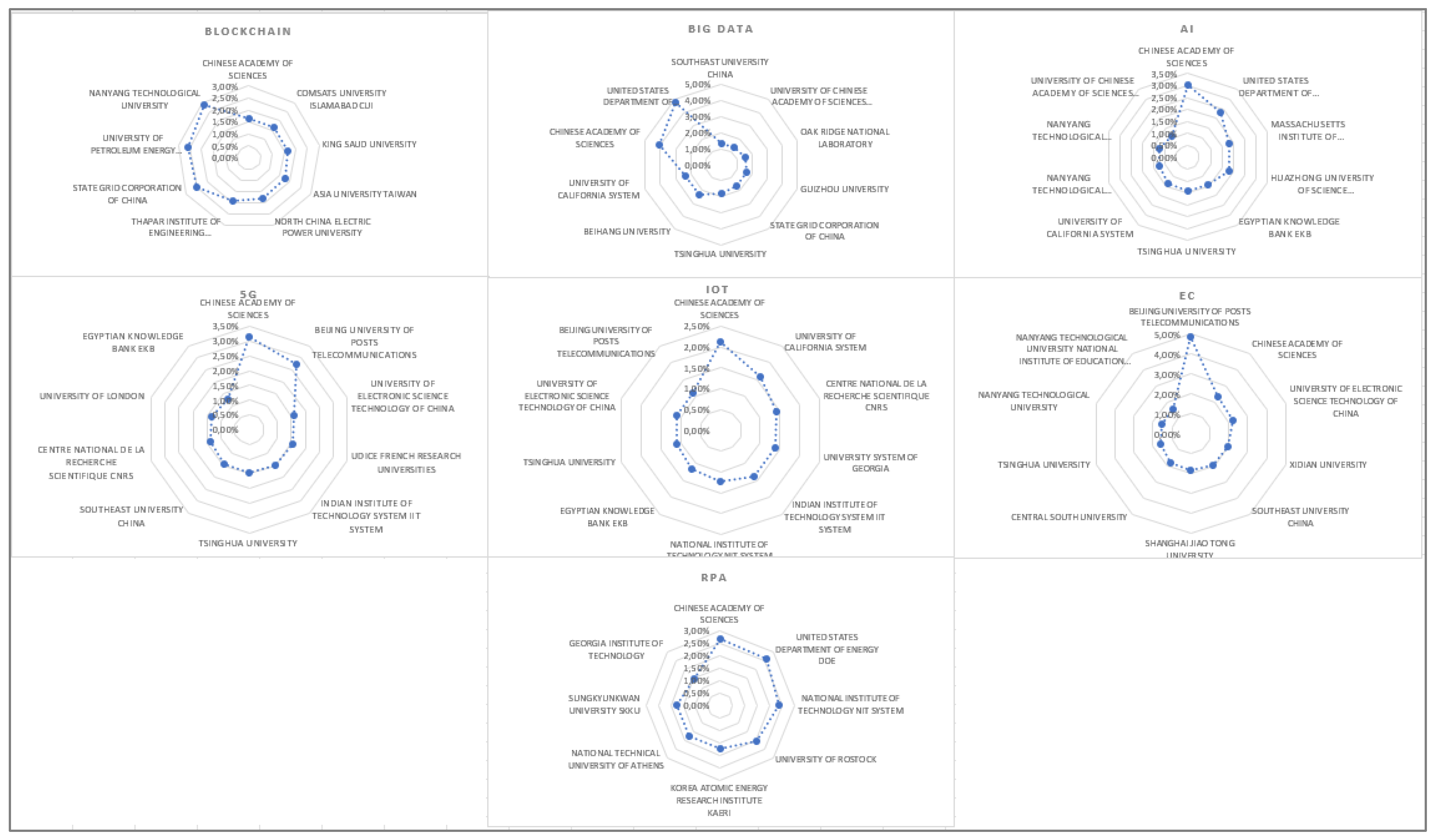


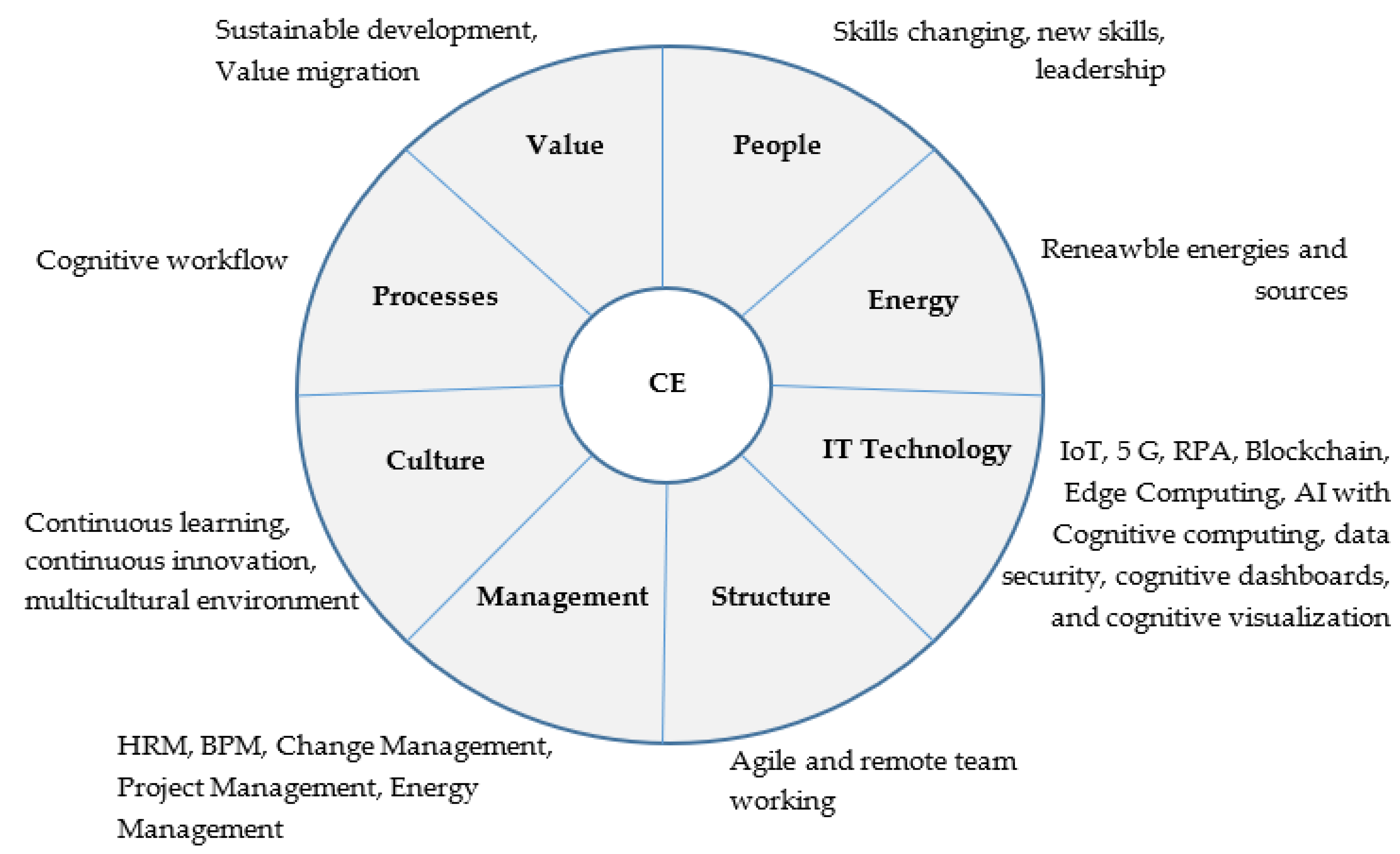
| Year | Blockchain | Big Data | AI | 5G | IoT | EC | RPA |
|---|---|---|---|---|---|---|---|
| 2013 | 0 | 115 | 506 | 241 | 200 | 0 | 8 |
| 2014 | 1 | 261 | 616 | 308 | 375 | 0 | 11 |
| 2015 | 0 | 817 | 809 | 436 | 717 | 6 | 16 |
| 2016 | 7 | 1210 | 885 | 658 | 1204 | 34 | 18 |
| 2017 | 59 | 1421 | 1200 | 945 | 1896 | 149 | 24 |
| 2018 | 267 | 1649 | 1393 | 1291 | 2896 | 407 | 44 |
| 2019 | 445 | 1956 | 2344 | 1230 | 3467 | 752 | 33 |
| 2020 | 609 | 1938 | 3009 | 1801 | 3531 | 991 | 37 |
| 2021 | 823 | 2137 | 4444 | 1503 | 3741 | 1152 | 51 |
| Blockchain | BD | AI | 5G | IoT | EC | RPA | |
|---|---|---|---|---|---|---|---|
| Mean | 246 | 1278 | 1690 | 935 | 2003 | 388 | 26.9 |
| Median | 59 | 1421 | 1200 | 945 | 1896 | 149 | 24 |
| Sum | 2211 | 11,504 | 15,206 | 8413 | 18,027 | 3491 | 242 |
| SD | 312 | 741 | 1326 | 558 | 1436 | 462 | 15.1 |
| Minimum | 0 | 115 | 506 | 241 | 200 | 0 | 8 |
| Maximum | 823 | 2137 | 4444 | 1801 | 3741 | 1152 | 51 |
Publisher’s Note: MDPI stays neutral with regard to jurisdictional claims in published maps and institutional affiliations. |
© 2022 by the author. Licensee MDPI, Basel, Switzerland. This article is an open access article distributed under the terms and conditions of the Creative Commons Attribution (CC BY) license (https://creativecommons.org/licenses/by/4.0/).
Share and Cite
Pilipczuk, O. Building the Cognitive Enterprise in the Energy Sector. Energies 2022, 15, 9479. https://doi.org/10.3390/en15249479
Pilipczuk O. Building the Cognitive Enterprise in the Energy Sector. Energies. 2022; 15(24):9479. https://doi.org/10.3390/en15249479
Chicago/Turabian StylePilipczuk, Olga. 2022. "Building the Cognitive Enterprise in the Energy Sector" Energies 15, no. 24: 9479. https://doi.org/10.3390/en15249479
APA StylePilipczuk, O. (2022). Building the Cognitive Enterprise in the Energy Sector. Energies, 15(24), 9479. https://doi.org/10.3390/en15249479







